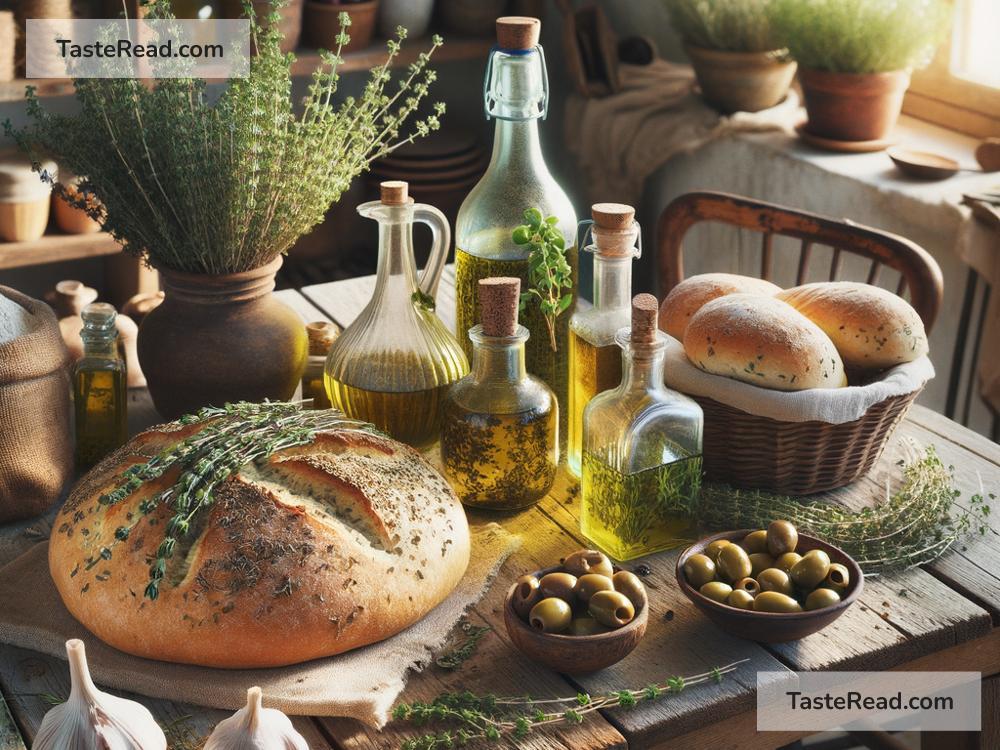Discovering the Aromatic Layers of Traditional Herb Breads in Greece
Have you ever tasted bread so flavorful that it feels like you’re eating a piece of history? In Greece, traditional herb breads are much more than food—they represent culture, nature, and joy. With every bite, you’ll savor aromatic layers that reflect the country’s deep-rooted culinary traditions and love for fresh ingredients. Let’s take a journey into the world of herb breads in the Mediterranean and discover why they are so special!
Bread: A Staple of Greek Life
Bread has always been at the heart of Greek cuisine. From ancient times to today, it is a symbol of hospitality and nourishment. For Greeks, bread isn’t just a side dish—it’s part of the main meal, often paired with olive oil, cheese, dips, or soups. Traditional herb breads stand out because they blend the comforting simplicity of bread with the vibrant aromas of Mediterranean herbs. It’s not just food; it’s art.
The Magic of Mediterranean Herbs
The Mediterranean region, and Greece in particular, is blessed with nature’s bounty. Its sunny climate and fertile soil produce fresh herbs that have been treasured for centuries. Herbs like oregano, thyme, rosemary, and basil grow wild across the country, perfuming hillsides and gardens. These herbs find their way into many Greek recipes, including bread, where they infuse each bite with earthy, floral, and slightly spicy flavors.
Some herb breads use one herb, while others mix several to create complex flavors. For example:
– Oregano Bread: Oregano is a signature herb in Greek cooking, used for its bold and earthy taste. When baked into bread, it adds an irresistible aroma.
– Thyme Bread: This herb’s mild lemony scent creates a refreshing flavor in bread.
– Rosemary Bread: Rosemary provides a woodsy and slightly peppery aroma that pairs wonderfully with olive oil.
– Mixed Herb Bread: This combines several herbs, often with garlic or lemon zest, for a multifaceted taste.
The Bread-Making Tradition in Greece
Making herb bread in Greece is not just a recipe—it’s a ritual. It often starts early in the morning, with the kneading of dough. Flour, water, yeast, and salt form the base, but the addition of herbs transforms this simple mix into something extraordinary. Herbs are often chopped fresh from the garden or dried for a more intense flavor.
Some recipes include olive oil, giving the bread a soft, moist texture and a subtle richness. Others might use a touch of honey or vinegar for added depth. Once the bread is prepared, it’s left to rise before being baked in either traditional wood-fired ovens or modern ones. The result is golden-brown, crusty on the outside, yet soft and fragrant on the inside.
A Connection to Nature
Herb breads in Greece are a celebration of nature. The herbs used are often very fresh, providing a direct connection to the land. Many people—especially in rural areas—still grow herbs in their gardens or collect them from the wild. Baking herb bread becomes a way to honor local produce and the Mediterranean ecosystem.
Even the olive oil used is often locally made, tying the bread to Greece’s famous olive groves. In every loaf, you’ll find a story: one of family traditions, respect for ingredients, and the harmony between human life and nature.
Pairing Herb Bread with Greek Food
Greek herb breads are incredibly versatile. In a country known for its delicious cuisine, they pair easily with a variety of dishes. Here are a few ideas:
– With Olive Oil and Olives: Dip slices of herb bread into extra virgin olive oil, sprinkle with a pinch of sea salt, and enjoy with a side of Kalamata olives.
– With Cheese: Feta, a salty and crumbly cheese, is a classic choice with herb bread. You can also try graviera or myzithra for variety.
– With Soups and Stews: Greek lentil soup (fakes) or chickpea soup (revithosoupa) are perfect companions to herb bread.
– As a Snack: Herb bread tastes amazing toasted or fresh, with a dollop of tzatziki (yogurt and cucumber dip).
Herb Bread’s Role in Greek Culture
Herb bread isn’t just tasty—it carries cultural significance. It’s often shared during family meals, festivities, and religious celebrations. In some villages, women gather to bake bread together, exchanging recipes and stories as they work. This communal spirit makes herb bread more than food—it’s a vessel for connection and tradition.
Experience Greece Through Its Herb Bread
If you ever visit Greece, don’t miss the opportunity to try its herb breads. Visit a local bakery or find a restaurant that serves fresh, homemade bread. If you can’t visit right now, you can bring a taste of Greece to your own kitchen. Try making herb bread with fresh Mediterranean herbs from your local market—it’s easier than you think!
Discovering the aromatic layers of herb breads offers more than just delicious flavors. It provides a glimpse into the soul of Greece—a country that values simplicity, nature, and sharing food with loved ones. Whether you’re savoring oregano’s boldness, thyme’s brightness, or rosemary’s warmth, every bite of herb bread is a journey to the Mediterranean.
So, what are you waiting for? Sprinkle some herbs, knead some dough, and start your own Greek adventure!


